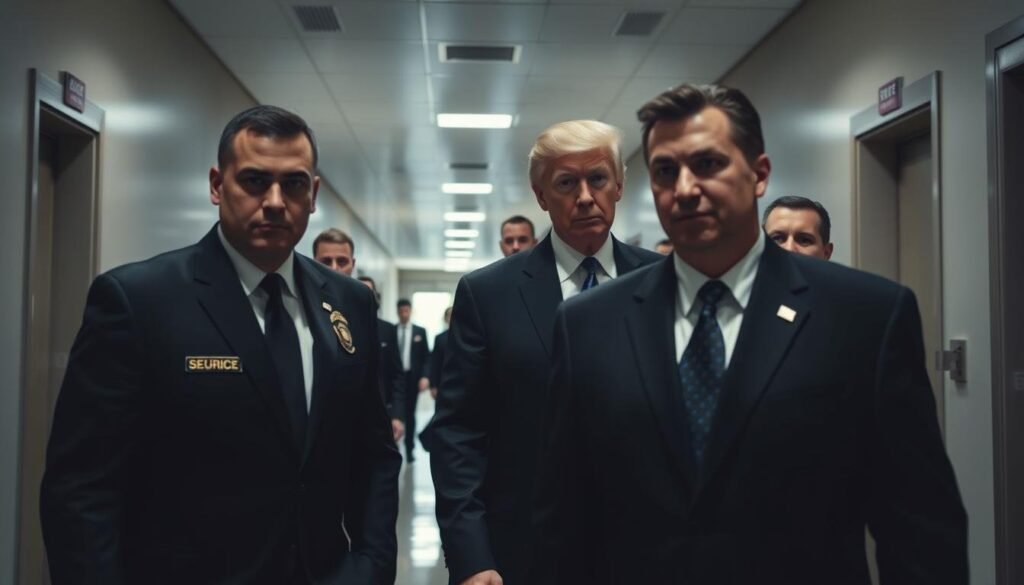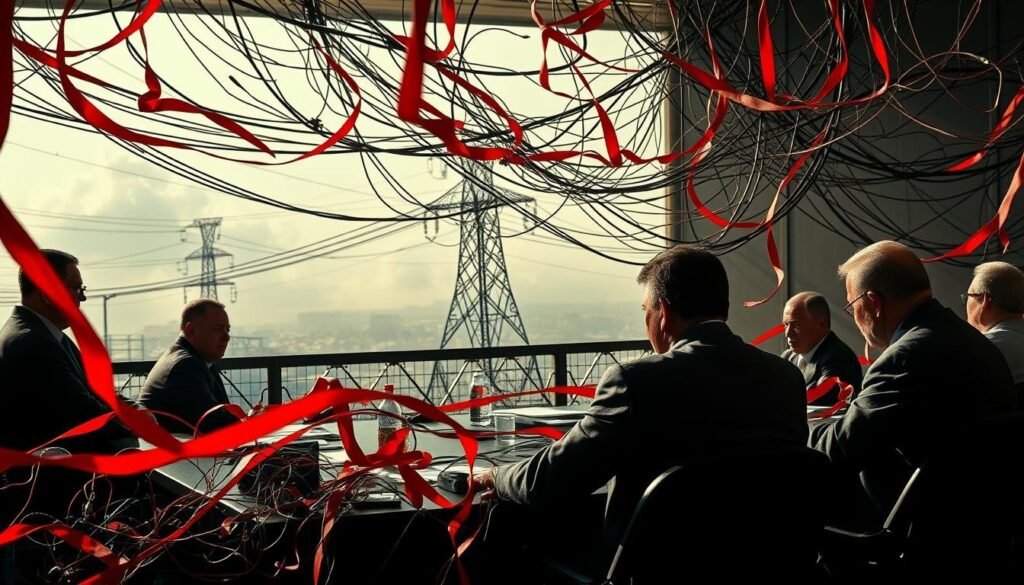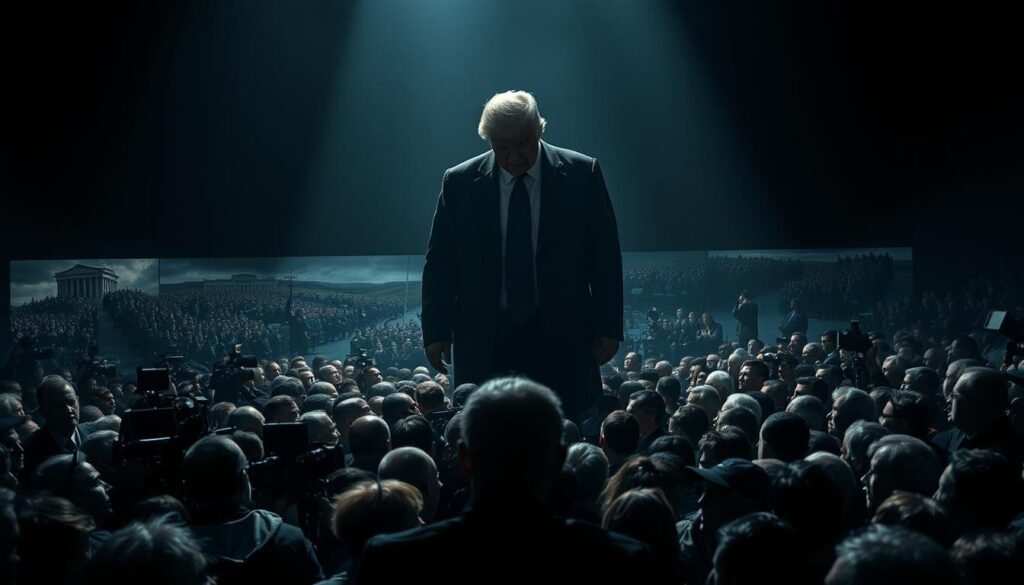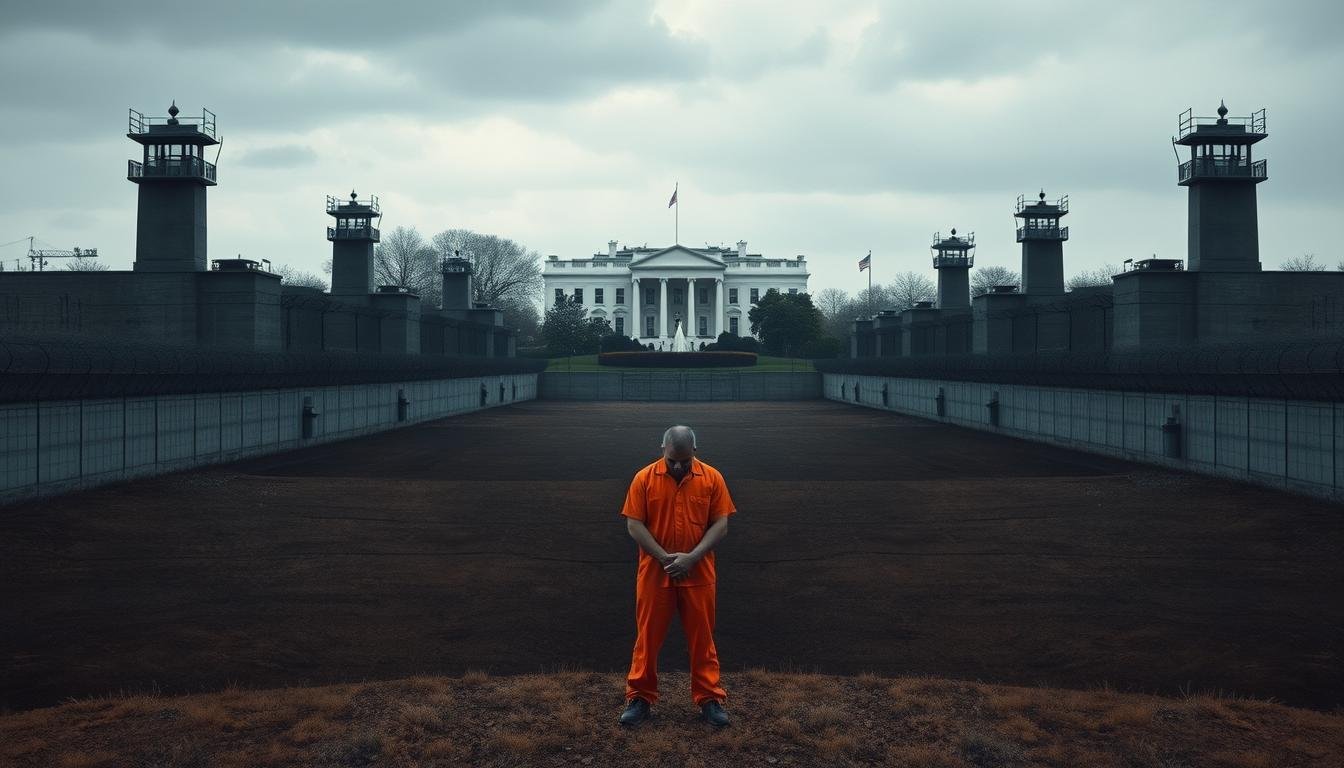What Happens If a Sitting President Goes to Jail? Have you ever thought about what happens if a US president goes to jail? This is a complex issue. It involves the constitution, legal rules, and how it affects the government.
This situation makes us think about power and the law. It’s especially true for constitutional implications. We’ll look at what could happen and how it affects the country.
This topic is important because it affects how the US government works. It also changes how people see the government. The idea of a president being jailed is serious and needs careful study.
Contents
- 1 The Constitutional Framework
- 2 Historical Context of Presidential Legal Issues
- 3 Can a Sitting President Be Indicted?
- 4 What Happens If a President Goes to Jail: Legal Mechanics
- 5 The 25th Amendment Implications
- 6 Impeachment as an Alternative Process
- 7 Executive Privileges During Incarceration
- 8 Practical Governance Challenges
- 9 Presidential Pardon Powers and Limitations
- 10 Public Perception and Political Fallout
- 11 International Precedents and Comparisons
- 12 Conclusion: What Happens If a Sitting President Goes to Jail?
- 13 FAQ
- 13.1 Can a sitting US president be indicted and face jail time?
- 13.2 How would the Secret Service protect a president in jail?
- 13.3 What happens to a president’s executive privileges during incarceration?
- 13.4 Can the 25th Amendment be invoked if a president is jailed?
- 13.5 How might impeachment be related to a president facing jail time?
- 13.6 What are the practical governance challenges if a president is incarcerated?
- 13.7 Can a president pardon themselves if they are incarcerated?
- 13.8 How might the public react to a president being jailed?
- 13.9 Are there any international precedents for a head of state facing jail time?
The Constitutional Framework
The Constitution sets out the powers and limits of the presidency. It gives us a clear view of the legal and political sides of a president being jailed. It’s key to look at the articles and amendments that matter when a president faces jail time.
The Constitution gives the president big presidential powers. They can grant pardons, except in cases of impeachment. But it also explains how to impeach and remove a president. This is important for understanding what happens if a president goes to jail.
Article II and the 25th Amendment are especially important. They talk about the president’s duties and passing power to others. Knowing these parts helps us see the possible effects of a president being jailed.
Looking at the Constitution helps us understand the legal and political sides of a president being jailed. It’s a complex issue, but the Constitution gives us a clear guide.
Historical Context of Presidential Legal Issues
Many U.S. presidents have faced legal troubles that tested the country’s laws and politics. Looking at these past cases helps us understand how the system might act if a president is in trouble.
Andrew Jackson was involved in many controversies, including power abuse claims. Later, Bill Clinton was impeached by the House in 1998. These stories show how hard it is to balance legal duties with political needs.
Learning from these examples helps us see the complexities of presidential legal issues. The U.S. Constitution sets the rules, but each case can have different results. By studying these past situations, we can better understand the possible actions a president might take when facing legal problems.
Can a Sitting President Be Indicted?
Indicting a sitting president is a big deal. It brings up questions about presidential immunity. Looking into landmark court cases is key to understanding this complex issue. [What Happens If a Sitting President Goes to Jail?]
Nixon v. Fitzgerald
In Nixon v. Fitzgerald, the Supreme Court talked about presidential immunity. They said President Nixon couldn’t be sued for actions done as president. This case is important for understanding how far presidential immunity goes.
The case of Clinton v. Jones also shed light on presidential immunity. The Supreme Court said a president can be sued for things done before they took office. This allowed Paula Jones’s lawsuit against President Clinton to move forward.
These cases show that while presidents have some immunity, it’s not complete. The debate on whether a president can be indicted keeps going, based on these and other court decisions.
Thinking about these rulings shows that the question of indicting a president is still up for debate. [What Happens If a Sitting President Goes to Jail?]
What Happens If a President Goes to Jail: Legal Mechanics
If a president is jailed, the U.S. legal system faces big challenges. The main worry is the president’s safety and ability to do their job while in jail. [What Happens If a Sitting President Goes to Jail?]
Secret Service Protection Requirements
The Secret Service must protect the president always. This protection is crucial even in a jail setting, leading to questions about how it would work. The Secret Service would need to team up with the jail to keep the president safe without risking the jail’s security.

Another big issue is the president’s access to secret information. As the commander-in-chief, the president needs to see sensitive info to make good decisions. But, jails aren’t set up to keep this information safe.
There are a few ways to solve this problem, such as:
- Setting up secure ways to talk within the prison.
- Moving the president to a place that can handle secret info.
- Using technology to let the president safely see secret materials from afar.
Each solution has its own problems, like how to make it work, keeping it safe, and following the law. [What Happens If a Sitting President Goes to Jail?]
The 25th Amendment Implications
If a president goes to jail, the 25th Amendment might be used to handle presidential disability. This amendment to the U.S. Constitution explains who takes over next and how to deal with a president who can’t work.
The amendment has important parts that matter if a president is locked up. Section 3 lets the president give power to the vice president for a short time. This could happen if the president is in jail but can still do some work.
| Section | Purpose | Relevance to Jailed President |
|---|---|---|
| Section 1 | Establishes order of succession | Could be invoked if president is incapacitated |
| Section 3 | Allows president to transfer power temporarily | Relevant if president is jailed but able to perform some duties |
| Section 4 | Allows vice president and cabinet to declare president unfit | Could be used if president is jailed and unable to perform duties |
Knowing about these parts is key to understanding what happens if a president is jailed. It helps us see how it affects the U.S. government. [What Happens If a Sitting President Goes to Jail?]
Impeachment as an Alternative Process
The impeachment process is a way to remove a president who has been arrested. You might wonder how it works and what it means for a president in jail. It’s a key part of the U.S. political system, aimed at keeping public officials in check.
The House of Representatives starts the impeachment process. They look into the president’s actions and vote on articles of impeachment. If most of them agree, the president is impeached. Then, the Senate holds a trial to decide if the president should be removed.
Impeachment might happen if a president is arrested. But, being arrested itself isn’t enough to impeach a president. Congress must decide if the president’s actions are serious enough to remove them from office.
Congress and the Senate play a big role in impeachment. They must think carefully about the president’s actions. They consider legal, political, and ethical factors in their decision.
It’s important to understand impeachment when a president is arrested. This process has both legal and political sides to it. [What Happens If a Sitting President Goes to Jail?]
Executive Privileges During Incarceration
When a president is jailed, it raises big questions about their executive powers. As the top of the executive branch, they have special rights. This includes the power to claim executive privilege for some talks.
Executive privilege is a rule from the Constitution. It lets the president fight off some orders from Congress and the courts. But, if a president is locked up, it’s not clear how this rule works.
One big question is if being jailed stops a president from using executive privilege. The table below shows different situations and what they mean for executive privilege.
| Scenario | Implication for Executive Privilege |
|---|---|
| President remains in office | Executive privilege likely continues |
| President is incapacitated | Executive privilege may be limited or transferred |
| Temporary incarceration | Executive privilege may continue, with adjustments |
In conclusion, how jail affects a president’s executive powers is complex. It depends on why they’re jailed and if they can still do their job. [What Happens If a Sitting President Goes to Jail?]
Practical Governance Challenges
If a president goes to jail, the government faces big challenges. The president’s role is key in making and acting on decisions. This is crucial for the country’s daily governance.
With the president in jail, the government’s normal work is at risk. Other government parts and the administration must step up. The vice president and cabinet members will play big roles in keeping things going.

The administration might have to use other officials for presidential duties. They might give tasks to top officials or use the 25th Amendment to share power. [What Happens If a Sitting President Goes to Jail?]
Good governance in this situation needs teamwork and flexibility. The executive, legislative, and judicial branches will work together. This will be a complex task for them.
Presidential Pardon Powers and Limitations
When a sitting president might face jail time, it’s key to know about their pardon powers. The U.S. President can grant pardons and reprieves, except for impeachment cases. This means they can forgive or lessen sentences for those convicted of federal crimes.
But, there are big limits to this power. A president can’t pardon themselves, which is a big issue. It raises questions about fairness if a president is being investigated. Also, pardons don’t help in impeachment cases. So, a president or others impeached can still face trial and removal by the Senate, even with a pardon.
The relationship between pardon powers and a president going to jail is complex. A president might pardon others involved in their legal issues. But, the question of self-pardon is still open. Knowing these details helps us understand what happens if a president ends up in jail.
Public Perception and Political Fallout
A president behind bars would be a huge crisis for the U.S. political system. People would have different views. Some might see it as a sign of accountability. Others might think it’s a political attack.
The political fallout could be big. It might lead to:
- More division in the government and among the public
- Demands for the president to resign or be impeached
- A drop in trust in the presidency and government

The president’s incarceration would make it hard for the administration to keep a united image. The media would focus a lot on this. It would be a mix of legal actions, political moves, and what people think.
What affects public opinion includes:
- The charges against the president
- How fair the legal process seems
- The administration’s reaction to the situation
In the end, a president in jail would change how people see politics and stability. The administration and others would need to be very careful. [What Happens If a Sitting President Goes to Jail?]
International Precedents and Comparisons
The idea of a sitting president going to jail might seem new in the US. But other countries have dealt with similar situations. For example, in 2017, Park Geun-hye, South Korea’s former President, was impeached and got 24 years in prison. This shows that leaders can face justice through the law.
Looking at other countries, we see different ways to handle leaders in legal trouble. In Italy, former Prime Minister Silvio Berlusconi was in court many times. He was found guilty of tax fraud and bribery. Even though he wasn’t jailed because of his age and health, his cases show the challenges of trying high officials.
These examples from around the world help us understand what might happen if a US president got into legal trouble. Each country’s laws are different, but learning from these cases can give us clues about the legal, political, and social effects of such situations.
Conclusion: What Happens If a Sitting President Goes to Jail?
You’ve looked into the complex situation of a US president going to jail. You’ve seen the legal, constitutional, and practical sides of it. The US political system has ways to deal with such big issues.
The 25th Amendment and impeachment help handle a president’s problems. These tools show how strong and flexible the US system is. They also show why checks and balances are key. [What Happens If a Sitting President Goes to Jail?]
Thinking about what happens next shows the US system can handle it. It keeps governance going and follows the law. This summary wraps up our look at this important and interesting scenario.
See Also: Benjamin Franklin was president of the United States
FAQ
Can a sitting US president be indicted and face jail time?
The debate on whether a sitting US president can be indicted is ongoing. Cases like Nixon v. Fitzgerald and Clinton v. Jones have set legal precedents.
How would the Secret Service protect a president in jail?
The Secret Service must protect the president, even in jail. This might require special arrangements to ensure their safety.
What happens to a president’s executive privileges during incarceration?
Incarceration could challenge the president’s executive privileges. This might impact their ability to exercise presidential power.
Can the 25th Amendment be invoked if a president is jailed?
The 25th Amendment addresses presidential disability and succession. It could be used if a president is deemed unfit due to jail time.
Impeachment allows for removing a president from office. It could be a process if a president is jailed.
What are the practical governance challenges if a president is incarcerated?
The president’s role is crucial for governance. Their absence would pose significant challenges to maintaining normal government functions.
Can a president pardon themselves if they are incarcerated?
The president can grant pardons, but not to themselves. This is a key limitation of their pardoning power. [What Happens If a Sitting President Goes to Jail?]
How might the public react to a president being jailed?
A president’s jail time would likely cause public and political uproar. It could affect their ability to govern effectively.
Are there any international precedents for a head of state facing jail time?
Other countries have dealt with similar situations. These examples offer insights into the potential outcomes for a president facing jail time.

Hi, I am Tatum Bradford from Washington. I have a background in political science and work as a senior revenue officer. I love learning about U.S. presidents and sharing interesting facts about political history.

